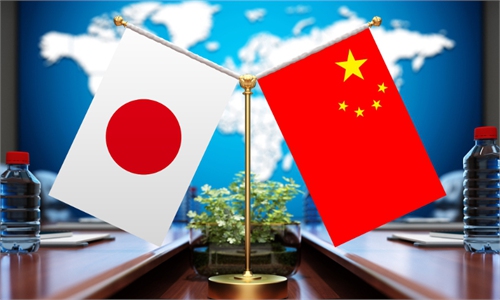
Illustration: Chen Xia/Global Times
Japan's economy shrank by an annualized rate of 2.1 percent in the July-September period as consumption and investment weakened, the government said on Wednesday, marking the first contraction in three quarters. The faltering condition of the world's third-largest economy contrasts with China's economy, which was marked by a stabilizing recovery during the quarter.Concerns about Japan's lagging economic recovery are being exacerbated by the continuous depreciation of the yen, prolonged and uncertain inflation, and the unsatisfactory effectiveness of its economic stimulus plans. The spillover effects of Japan's predicament on the regional economy deserve attention.
The yen is the worst-performing major currency at present. The exchange rate fell to nearly a 33-year low this week. The sharp depreciation of the yen has put pressure on Asian countries' exports of competing products.
In early November, the Japanese government approved a comprehensive economic stimulus plan of 17 trillion yen ($112.53 billion) in an effort to help Japanese households cope with the pressure of high prices. However, the actual effectiveness of the plan is still being observed. A recession further complicates the situation. With the economic contraction in the third quarter, it is still questionable when the Japanese central bank will normalize its monetary policy.
While Japan's economy is deeply mired in trouble, China's imports from Japan declined by 15.4 percent from January to October this year, while overall bilateral trade declined 12.2 percent year-on-year. With Japan's economy shrinking and the yen's exchange rate approaching a 33-year low, China needs to pay attention to the impact on its own economy.
For some time now, China-Japan economic and trade cooperation has been affected not only by Japan's struggling economy but also Tokyo's economic and trade policies toward China.
Japan has strengthened its strategic cooperation with the US and provoked China on various issues, moves that have affected the normal development of China-Japan economic and trade relations. In the face of this downward economic pressure, Japan needs to reduce political interference in normal economic and trade cooperation.
China and Japan have a significant level of economic interdependence, making them each other's most important trading partners. Improving economic and trade relations with China is beneficial for the Japanese economy.
With the implementation of the RCEP in early 2022, 86 percent of Japan's exports to China and 88 percent of Japan's imports from China become tariff-free. This effectively strengthened economic and trade ties, boosting the scale of goods trade and having a positive impact on both economies and the regional economy.
There are many areas of technology and innovation where China and Japan can further expand cooperation. For Japanese companies, China can become their largest market, and cooperation in technology, management and production provides opportunities for Japanese companies to expand their overseas markets and presence.
Take the semiconductor industry, for example. Although the Japanese government in July imposed restrictions on the export of advanced semiconductor manufacturing equipment, about 30 percent of Japan's semiconductor export income comes from the Chinese mainland, according to media reports.
The Japanese government needs to recognize that economic interactions cannot be blocked by artificial interventions. It wouldn't be cost-effective for Japan to interfere with economic and trade cooperation just to follow the dictates of the US. A wide range of Japanese companies still have high expectations for expanding economic and trade cooperation between China and Japan.
There is no zero-sum game in the economic relationship between China and Japan. China's massive market holds significant long-term development opportunities for the Japanese economy. Japan should change its strategic thinking about China and actively promote the transformation and upgrading of bilateral economic and trade cooperation, expand cooperation in various fields and tap into the potential for cooperation.
The author is a reporter with the Global Times. bizopinion@globaltimes.com.cn



